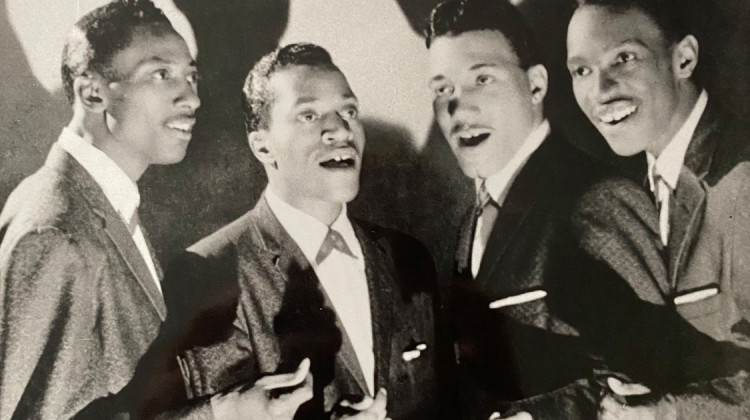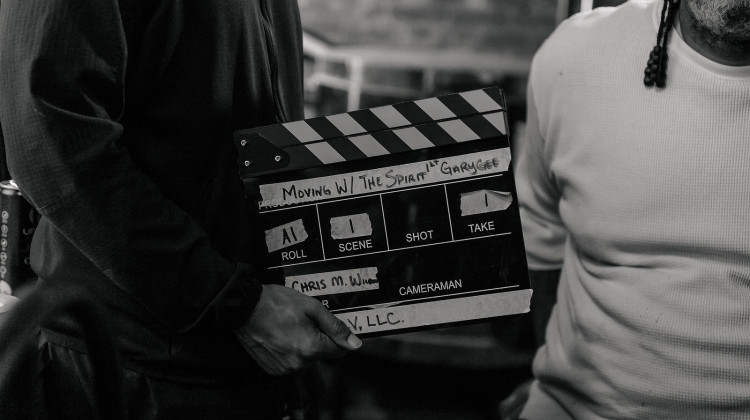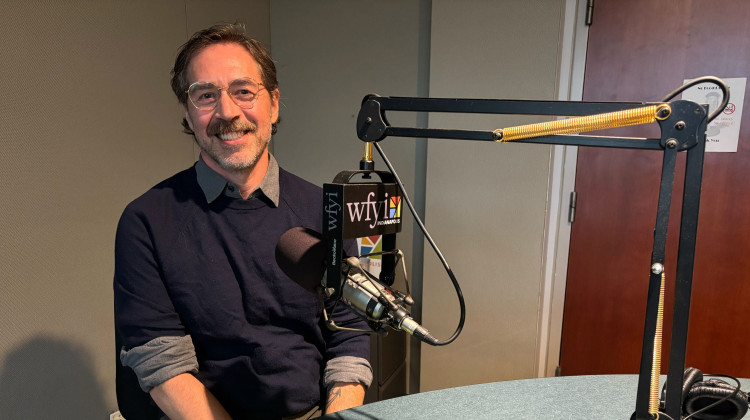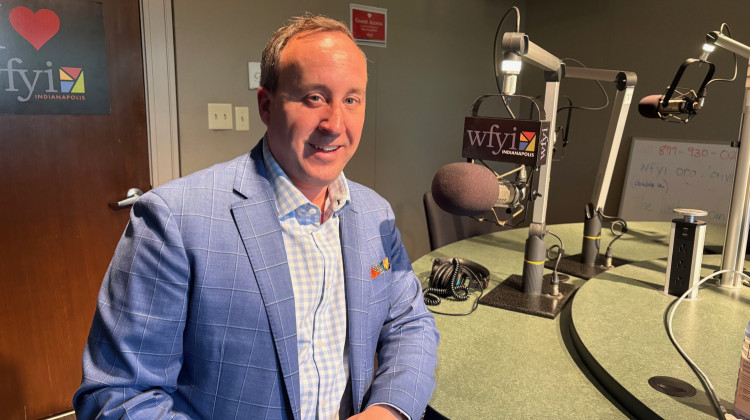
Guilford’s career in Indianapolis spanned over six decades of music making. Here he is with The Four Sounds, standing third from the left.
Photo courtesy of Jimmy Guilford's collectionIn August of 2024, Indianapolis lost one of its most notable voices.
Vocalist Jimmy Guilford is known by music fans worldwide for the doo-wop and soul music recordings he made during the 1950s and 60s. Guilford's career in Indianapolis spanned over six decades of music making.
WFYI’s Kyle Long spoke with Guilford in 2019, and brings us this remembrance.
This transcript has been edited for length and clarity.
Kyle Long: I had the chance to get to know Guilford during the final years of his life, and in 2019 we met for an interview at his Northside home. He told me his career as a performer started as a child during the 1940s, singing outside of a record store on the streets of Martindale-Brightwood.
Jimmy Guilford: The guy that owned a record shop, Mr. Meyers, he would pipe music outside so people could hear it. That way, people would come in and buy a record. Me and a couple of my cousins, we'd go outside and stand and listen to these songs. Well, some of those songs I liked. Then when the music wasn't playing, I would start singing.
Long: Guilford's first big break came in the 1950s when he joined forces with the Indianapolis rock star Thurston Harris, best known for his 1957 hit “Little Bitty Pretty One.” Guilford sang backup for Harris' group the Lamplighters. The famous Indiana songwriter Hoagy Carmichael paid for Guilford's first studio session with the group.
Guilford: I joined with Thurston. See, a lot of people think Thurston is from California. He was from California Street. He lived in the second house from the corner of Michigan and California. When we first moved here, I lived in the second house from Indiana Avenue and California.
That's when I got with Thurston and we recorded here. Hoagy Carmichael used to come down to the Sunset and sit in and play. Hoagy was living at the Columbia Club, and he would come down there and play behind us while we was playing with the band.
Long: Guilford was still in high school when he began performing in nightclubs on Indiana Avenue. It was a secret he kept from his mother, who thought he was training as a boxer at the local YMCA.
Guilford: So I'd be out at night, because she thought I was over at the Y practicing boxing. But back in the old days, your insurance man would come to your house and collect your premium. He come over to the house and he saw me. He said, “Boy, that boy of yours really knocked them out last night.” And mama said, “Yeah, I've been wanting to see him fight.”
He said, “No, he knocked him out when he sung ‘Danny Boy.'” She said, “What do you mean sung “Danny Boy?'” He said, “He sung ‘Danny Boy’ at the Cotton Club. And she said, “My son was singing in the Cotton Club?” I said, “I'm gonna get it when my dad comes home, he’s gonna kill me.”
Long: Guilford's debut as a lead vocalist and songwriter came in 1961 on a recording titled “The Ring” with his group The Four Sounds. The single was independently released by the band's manager Isaac “Tuffy” Mitchell, an Indianapolis nightclub owner with ties to organized crime. Guilford told me the song was climbing the charts nationally when Mitchell inadvertently caused the record to be blacklisted from airplay. The incident started with a phone call.
Guilford: I went to the phone and the guy said, “I'm with Dick Clark productions.” I said, “I'll let you talk to my manager, because he talks business. I just sing.” So I gave the phone to Tuffy, and Tuffy said “Hello.” The guy told him who he was, and said “I'm going to do this and I'm going to do that.” Tuffy said, “You go to hell. I'll buy you and sell you. I don't need you. I got my own money,” and he hung up on the guy. This was on a Saturday at about 4:30, on Monday morning you could not hear “The Ring” on any station in the United States, and it was like number three in New York.
Long: By the mid-1960s Guilford had gone solo, cutting a series of soul singles in Detroit that would become classics in Europe.
Guilford: I went up to Detroit, and I met Thelma, who was Berry Gordy's wife. I signed a four year contract, and we recorded a bunch of stuff I wrote. They said in my contract that I'd have three releases per year, but they didn't release nothing that I wrote.
But I have to say that all the songs I did, they went to Europe and went to number one in Europe. I became the king of rock and roll in Europe, what they call Northern Soul.
Long: In the late 1960s Guilford returned to Indianapolis for good, becoming a fixture in the local nightclub scene and later, musical theater. When I asked Guilford if he had any regrets looking back at his career in music, he left me with a sage observation about the business he dedicated his life to.
Guilford: I've been further than most and not as far as some. To make it anywhere in this music, you got to be doing something. This music isn't quite about how good you are, it’s who's handling you, and do they handle you right.
There are a lot of people that are better than me that ain't been heard yet and they can't get heard. That's a shame. You can do your best and still not make it. This is only business. You can be a millionaire and not be good, or you can be the best thing in the world and not be able to make a dime.
This interview originally aired on WFYI's Cultural Manifesto.
 DONATE
DONATE







 Support WFYI. We can't do it without you.
Support WFYI. We can't do it without you.